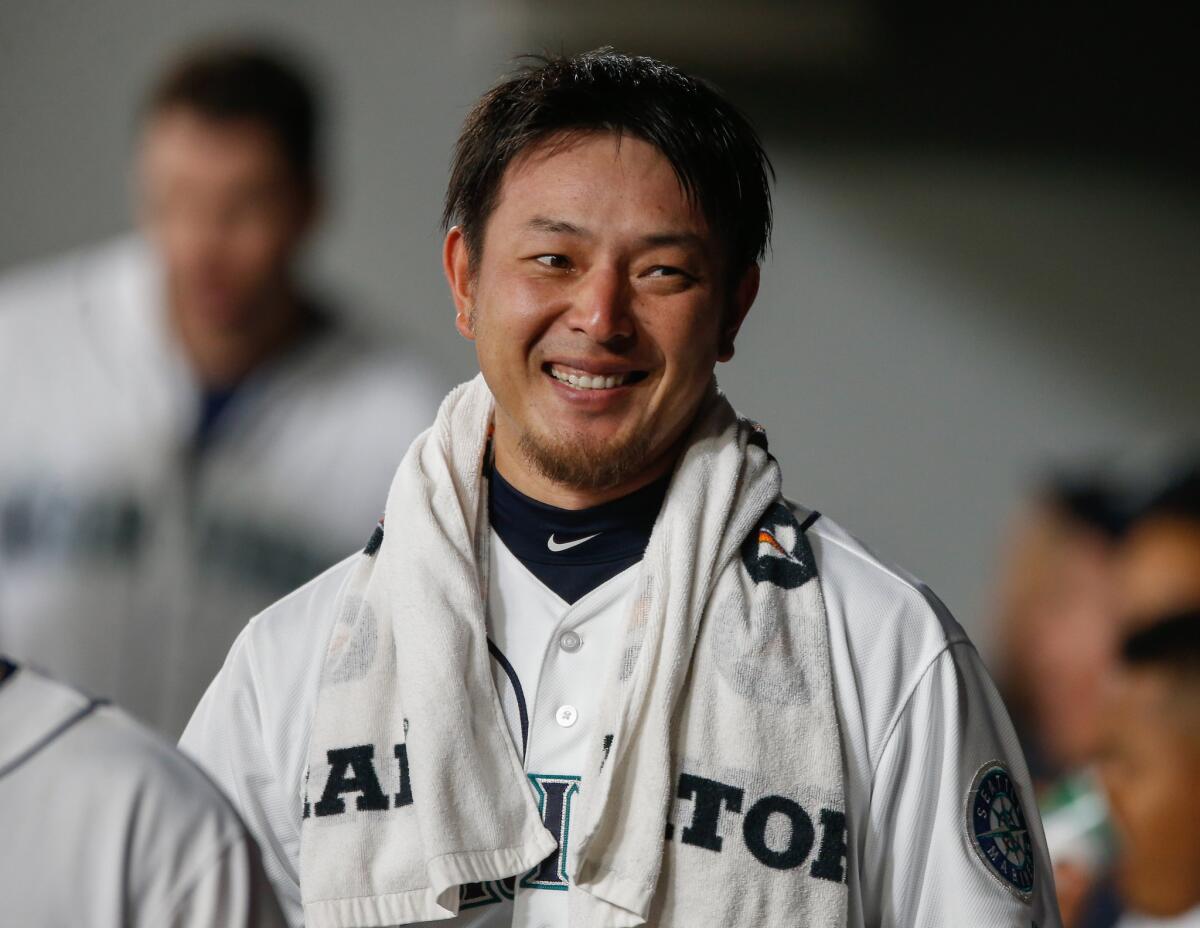In Hisashi Iwakuma, the Dodgers find a modestly priced addition to rotation

Hisashi Iwakuma was 9-5 with a 3.54 ERA last season for the Seattle Mariners, including a no-hitter in August against the Baltimore Orioles.
Meet Hisashi Iwakuma, not Zack Greinke’s replacement. Not a guy expected to start the All-Star game, not expected to have a 19-3 record with the lowest earned-run average Major League Baseball has had in 20 years.
Only right now, if the Dodgers fail to add a clear No. 2 starting pitcher, some people might expect Iwakuma to at least approach Greinke’s production. Which is not just unfair, but unrealistic.
The Dodgers were outbid for Greinke, who signed with the Arizona Diamondbacks for $206.5 million last week. And their immediate response was to sign Iwakuma for three years at $45 million, a deal that has yet to be officially announced.
The Dodgers were unwilling to go six years with Greinke, whose contract will take him through his age 37 season, yet willing to give Iwakuma three years that will take him through his age 37 season. Even though Greinke has been the picture of health and Iwakuma has battled injuries throughout his career.
The move also cost the Dodgers a first-round draft pick. Of course, there was that one other little factor of a savings — a difference of more than $161 million between the deals.
Greinke is a known entity, widely considered one of baseball’s top pitchers. Iwakuma is comparatively an unknown, particularly to those in Los Angeles used to following the National League.
Iwakuma, who turns 34 on April 12, is from Tokyo and pitched the first 14 years of his career at a star level in Japan’s Pacific League. When he first decided to come to the United States, his MLB posting rights were won by the Oakland Athletics. However, they could not reach an agreement and he returned to Japan.
The next year, at 31, he signed a one-year, $1.5-million contract with the Seattle Mariners. No one could have been expecting a whole lot. Then he got off to something less than an auspicious start, going 1-2 with two saves and a 5.13 ERA in his first 16 games.
But when he became more comfortable and familiar with baseball in the majors, and secure in the Mariners’ rotation, he became a solid to upper-tier pitcher.
He was 8-4 with a 2.50 ERA in the second half of 2012 and 14-6 with a 2.66 ERA and a 1.01 WHIP (walks and hits per innings pitched) in 2013. He finished third that season in voting for the American League Cy Young Award.
In his four seasons with the Mariners, he was 47-25 with a 3.17 ERA and 1.08 WHIP. He became their No. 2 starter, behind Felix Hernandez.
But the Mariners have a new general manager in former Angels’ GM Jerry Dipoto, who said re-signing Iwakuma was a priority but reportedly balked at giving him three years. This time the extra year fell the Dodgers’ way.
Like most pitchers from Japan who have found success in the major leagues, he is fairly big — 6 feet 4 and 210 pounds — but a long ways from a power pitcher. He barely breaks 90 mph with his fastball, one of his five pitches.
Control is his specialty. He walked 127 batters in his four seasons in the majors, striking out 551. He’s not the groundball machine Brett Anderson is, but more than half of the batters who face him hit grounders.
He has battled injuries throughout his career — shoulder, back, oblique, finger and elbow. Last season, he suffered a strained lateral muscle that kept him out nearly half the season. He returned in July and on Aug. 12 no-hit the Baltimore Orioles at Seattle.
Iwakuma is a member of Soka Gakkai International, something of a new-age Buddhism religion centered in Japan. After arthroscopic elbow surgery in 2007, Iwakuma said he was being tentative in his comeback before he was inspired by works from Soka Gakkai’s leader, Daisaku Ikeda.
He told Soka Gakkai’s monthly newsletter: “Sensing my anxiety, Sensei [Ikeda] looked at me and said: ‘Cast away your worries! Become strong!’ His guidance was strict yet warm. In his words I sensed with my entire being the trust and high expectations he placed in me.
“That day happened to be my birthday. I took it as Sensei’s lifelong gift to me.”
More to Read
Are you a true-blue fan?
Get our Dodgers Dugout newsletter for insights, news and much more.
You may occasionally receive promotional content from the Los Angeles Times.










